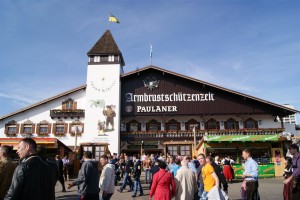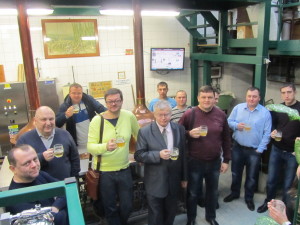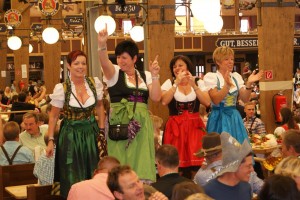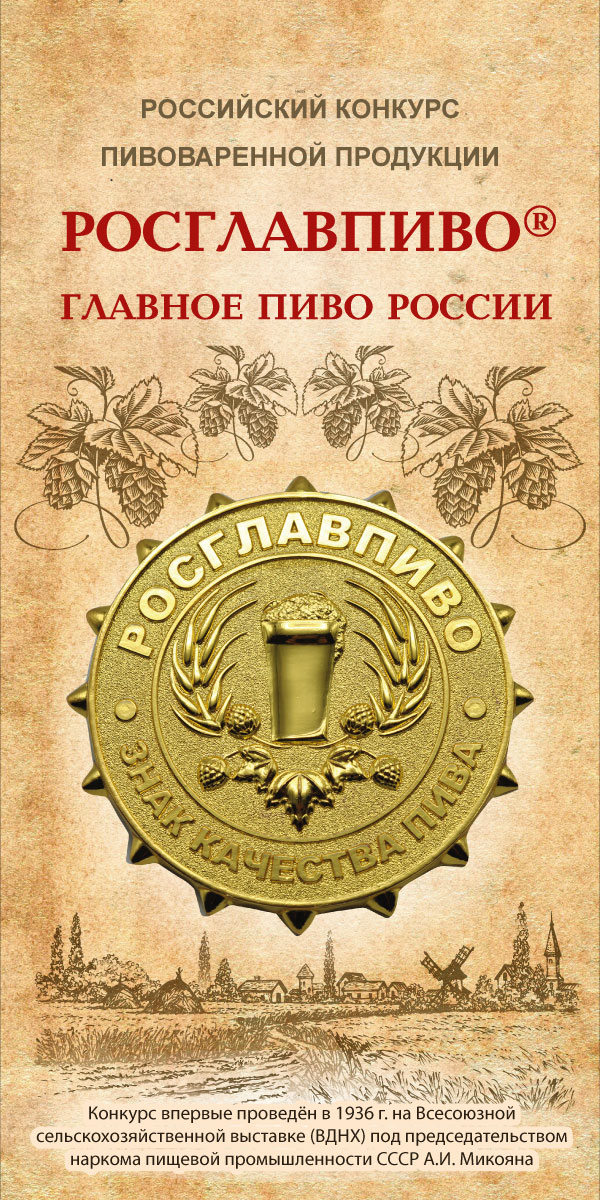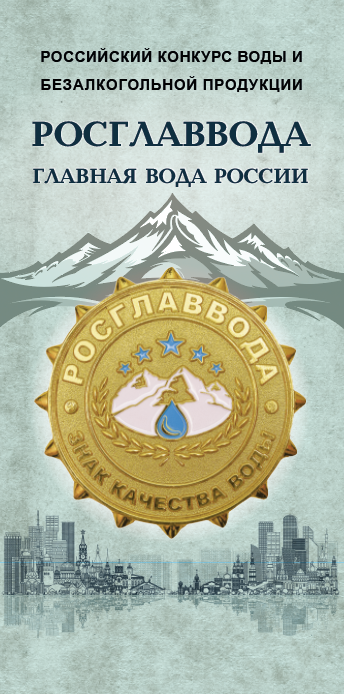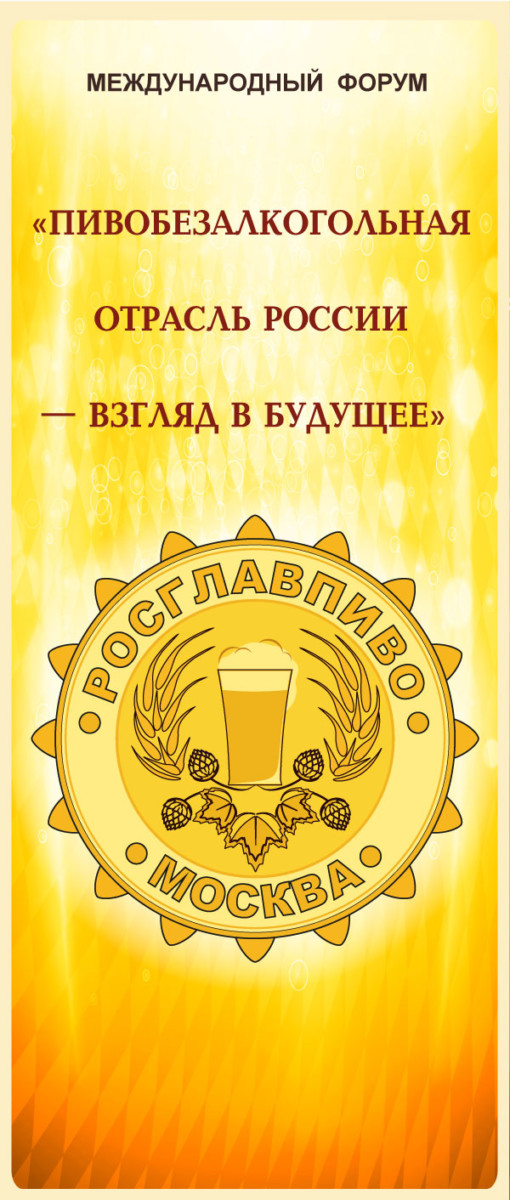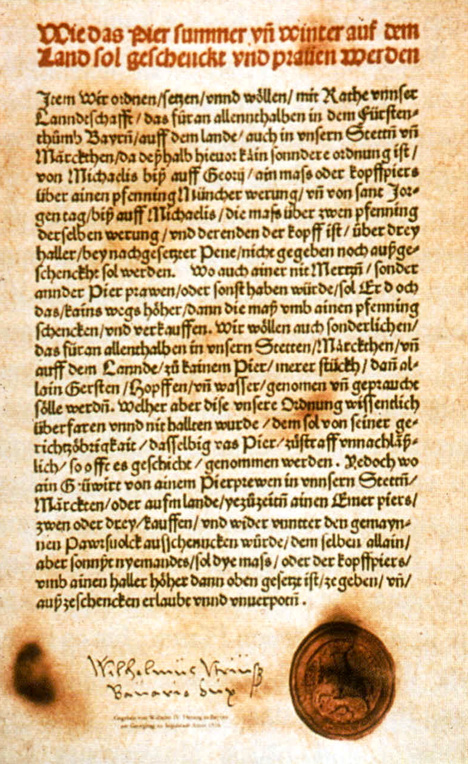Originaltext:
«Wir verordnen, setzen und wollen mit dem Rat unserer Landschaft, dass forthin überall im Fürstentum Bayern sowohl auf dem Lande wie auch in unseren Städten und Märkten, die keine besondere Ordnung dafür haben, von Michaeli (29. September) bis Georgi (23. April) eine Maß (bayerische, entspricht 1,069 Liter) oder ein Kopf (halbkugelförmiges Geschirr für Flüssigkeiten – nicht ganz eine Maß) Bier für nicht mehr als einen Pfennig Münchener Währung und von Georgi bis Michaeli die Maß für nicht mehr als zwei Pfennig derselben Währung, der Kopf für nicht mehr als drei Heller (gewöhnlich ein halber Pfennig) bei Androhung unten angeführter Strafe gegeben und ausgeschenkt werden soll.
Wo aber einer nicht Märzen sondern anderes Bier brauen oder sonstwie haben würde, soll er es keineswegs höher als um einen Pfennig die Maß ausschenken und verkaufen.
Ganz besonders wollen wir, dass forthin allenthalben in unseren Städten, Märkten und auf dem Lande zu keinem Bier mehr Stücke als allein Gersten, Hopfen und Wasser verwendet und gebraucht werden sollen.
Wer diese unsere Anordnung wissentlich übertritt und nicht einhält, dem soll von seiner Gerichtsobrigkeit zur Strafe dieses Fass Bier, so oft es vorkommt, unnachsichtig weggenommen werden.
Wo jedoch ein Gastwirt von einem Bierbräu in unseren Städten, Märkten oder auf dem Lande einen, zwei oder drei Eimer (enthält etwa 60 Liter) Bier kauft und wieder ausschenkt an das gemeine Bauernvolk, soll ihm allein und sonst niemand erlaubt und unverboten sein, die Maß oder den Kopf Bier um einen Heller teurer als oben vorgeschrieben ist, zu geben und auszuschenken.»
Gegeben von Wilhelm IV
Herzog in Bayern
am Georgitag zu Ingolstadt anno 1516
Translation of the original text:
We hereby proclaim and decree, by authority of our land, that henceforth everywhere in the Principality of Bavaria, in the country, as well as in our cities and marketplaces that have no such special ordinance for it: From Michaelmas [Sept. 29] until the Feast of St. George [April 23], a mug [1] or one head [2] of beer is not to be dispensed for more than one Munich penny, and from the Feast of St. George to Michaelmas, the liter mug shall not be dispensed for more than two pennies of the same currency, the head for not more than three Heller [3], by threat of the penalties spelled out below.
However, when one brews any beer (other than Märzenbier), it will under no circumstances be dispensed and sold for more than one penny per mug. Furthermore, we especially decree that henceforth in all our towns, marketplaces and the whole of the countryside, that for no beer shall any ingredients other than barley, hops, and water be used and employed. Anyone who knowingly ignores our threat and violates it, shall be punished by the court of his jurisdiction by having said barrel of beer summarily confiscated, each time it happens.
However, if an innkeeper buys one, two, or three pails [4] of beer from a brewery in our towns, marketplaces, or the whole countryside, for resale to the common people, he alone shall be allowed and permitted to sell mugs and heads of beer for one Heller more than prescribed above. Furthermore, We as the Prince of Bavaria reserve the right to ordain appropriate changes to this decree for the public benefit in the event that severe hardship should arise due to shortages and price increases of grains (since the seasons and the region and the harvest times in our land can vary); in that event, the right to adjust the regulations over the sale are explicitly expressed and established.
It was the most important part of the Decree translated in to Russian. Later, in the city of Ingolstadt in the duchy of Bavaria on 23 April 1516, two other dukes, including Duke Wilhelm IV of Bavaria, endorsed the law as one to be followed in their duchies, adding standards for the sale of beer.
German Beer Purity law is the oldest Law and in effect at the relevant time in Germany. In the original text, the only ingredients that could be used in the production of beer were water, barley and hops. German breweries are very proud of the Reinheitsgebot, and many claim still to abide by it.
Initially Beer Purity Law was created to guarantee high beer quality. Pending the Law, many producers used some additives that were often poisonous and intoxicating, for example, oxgall, juniper, milfoil, John’s-wort, henbane. According to the Law, today beer shall not contain chemical and other additives.
|
Beer Purity Law = Basic Law of Russian brewing industry
|
Beer bloggers often call followers of German brewing standards as “Reinheitsgeboter” and the President of our Union A. Mordovin – the main Russian “Reinheitsgeboter”.
«Reinheitsgeboters of all countries, Unite!
Barley, Malt, Hops & Beer Union






